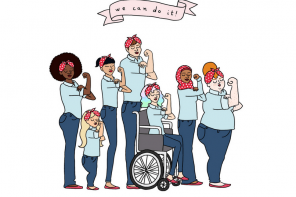As part of Altmuslimah’s efforts to explore gender themes that Islam has in common with other faiths, the star of ‘Blossom,’ Mayim Bialik, reflects here on how her Jewish faith and its concept of modesty (tzniut) changed the way she dresses.
Earlier this year, producers from the TLC make-over show What Not to Wear chose me to “fix.” It was eight months after I had given birth to my second son (my first was 3 years old ), and I had just completed a doctorate in neuroscience.
I had been wearing slouchy clothes since long before I had kids. I favored men’s oversized garments that hung loosely from my body and had never much cared for fashion or trends. For the most part, I spent little to no time on my appearance. From the time I was 19 until I turned 32, I devoted my time to studying, writing a thesis, and starting a family. But the acting itch never completely abated and I had decided to pursue it again rather than stay in academia. The actor’s life I want to pursue gives me more time to raise my children, rather than hand them over to a nanny. Getting a makeover seemed like a great opportunity to put together a new look that I could use on future auditions.
The WNTW producers asked if I have any clothing restrictions. Deep breath. “I don’t wear pants,” I told them. “I prefer skirts.” You see, I am what I guess you’d call a Conservadox Jew. I started embracing certain aspects of Jewish modesty, or tzniut, before my second son was born, and although I know many Orthodox women who don’t observe tzniut, the boundaries and framework of privacy it provides appealed to me.
I was raised in a traditional Reform household, the grand-daughter of poor Orthodox immigrants from Eastern Europe. For them, success in America came at the seemingly small price of relative assimilation. Growing up, I lived a pretty normal life; I had my own prime-time network TV show from the ages of 14 to 19, which meant my physical appearance and clothing choices were dissected on a weekly basis in gossip magazines and on television. I was pretty impervious to media critiques of my style. I had no real sense of my own physicality and took for granted the feminist idea that I should be able to walk around naked without harassment. But I soon learned that not everyone was a feminist.
After graduating from public high school in Los Angeles, I went to college at UCLA, where I met the man who’s now my husband. Knowing we wanted a traditional wedding ceremony, we started studying Judaism together to prepare for it. At first my lessons with an Orthodox instructor were almost anthropological—I was curious as to how Judaism viewed marriage and sexuality, but I did not really intend to increase my level of observance. The more I learned, however, the more my previous distance from traditional Judaism disappeared. I was also a serious person in general, and chose a wedding dress that reflected my serious attitude about marriage. Entering a sacred covenant before G-d, I wore an ankle-length, high-necked Victorian dress with sleeves past the elbow and a heavy veil, reminiscent (I hoped) of the matriarchs Leah and Rebekah.
During the days of the sheva brachot, the seven traditional feasts celebrated in the days after thechuppah ceremony, I tentatively covered my head with scarves and crocheted hats, trying on my new status as a married woman. Beyond wearing a ring, my lifestyle didn’t have a means of representing the change from single to married, and I was cautious about challenging the feminist ideals I’d previously embraced. But I liked feeling a physical representation in my new life as a married woman. In synagogue, I began covering my head with tichels (decorative scarves) from trips to Israel—just as my Orthodox cousins who I used to consider submissive and trapped in an archaic lifestyle taught me to wrap them—and fashionable hats. No flowers allowed. Too Blossom-y.
As my life progressed, tzniut became a bigger part of it and I started appreciating what it means to keep your sexual appeal for yourself and for your partner. I came to see that not everything that makes me beautiful, sexy, or desirable needs to be on display.
In the world of acting, though, maintaining a degree of modesty has been a challenge. I stopped wearing pants outside of the home in November 2007. (I still wear them at home or under dresses). These days, I am more comfortable in skirts rather than the baggy saggy pants I used to wear. Personally, I feel more attractive and more put-together in a skirt. Tzniut doesn’t mean making yourself less attractive; it means highlighting your strengths within limits.
But my definition of limits and that of the folks at WNTW differed. On and off the set, I discussed my skirt preference with the show’s producers. When the hosts showed me pants as a possible option in my wardrobe, I pointed out that I don’t much wear them. I didn’t claim to be the spokesperson fortzniut; after all, I still wear shirts above the elbows and don’t cover my head regularly.
I got wonderful new clothes, jewelry, and vegan shoes (one of my other preferences). When we filmed me revealing the final outfits they picked, I gently pointed out that skirts above the knee are not something I’d wear, and that I wouldn’t wear sleeveless shirts or dresses without something to cover my arms once I left the set. When the show aired, I saw that my qualifications and explanations did not survive the cutting room.
I don’t wish to claim that there is an “immodest agenda” on WNTW. It’s a show for the average American, who is most likely not Jewish, and if she is Jewish, she’s most likely not observant. In spite of the fact that the hosts kept telling me that I needed to be “sexy” and not “hide” in my clothing, I loved being a part of the show. They were right to encourage me to wear clothing that was my size, and to emphasize my figure where it needed emphasizing. But sexy doesn’t necessarily mean scantily-clad.
The week after WNTW was filmed, I auditioned to play a Hasidic woman on Saving Grace. When the call came in, I laughed, pulled a salvaged Israeli ankle-length dark denim skirt from the floor of my almost bare closet, threw on a WNTW-purchased tank, cardigan, and simple flats, and applied some lovely understated make-up. I booked the part.
Mayim Bialik starred in NBC’s Blossom from 1990 to 1994. More recently she has appeared on Curb Your Enthusiasm and Saving Grace and, this fall, will have a recurring role on The Secret Life of the American Teenager. This article was previously published in Tablet and is reprinted here with kind permission.





